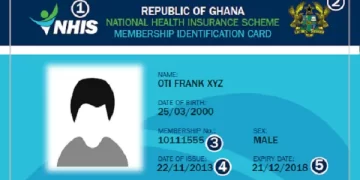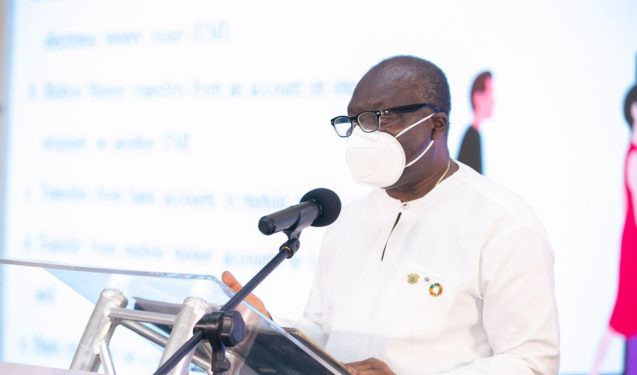Finance Minister, Ken Ofori -Atta has announced various expenditure cutting measures as part of the government’s commitment to achieving its fiscal target of 7.4% GDP for the 2022 fiscal year.
Announcing this a press briefing on Thursday, 24th March 2022, he said the emergence of global and domestic developments such as the COVID’19 and the Russian-Ukraine war have posed a major threat to the successful implementation of the 2022 government budget.
The minister noted that these two developments are clear forces shaping global events with Ghana not being spared.
The Minister however said the government’s expenditure cutting measures are therefore vital interim measures that will help the country recover from the economic challenges it is faced with.
To this end, the finance minister announced the following Expenditure Cutting Measures.
- Expenditure Cutting Measures
- Discretionary spending is to be further cut by an additional 10%. The Ministry of Finance is currently meeting with MDAs to review their spending plans for the rest of the three (3) quarters to achieve the discretionary expenditure cuts;
- these times call for very efficient use of energy resources. In line with this, there will be a 50% cut in fuel coupon allocations for all political appointees and Heads of government institutions, including SOEs, effective 1st April 2022;
- with immediate effect, Government has imposed a complete moratorium on the purchase of imported vehicles for the rest of the year. This will affect all new orders, especially 4-wheel drives. We will ensure that the overall effect is to reduce total vehicle purchases by the public sector by at least 50 percent for the period;
- again, with immediate effect Government has imposed a moratorium on all foreign travels, except pre-approved critical/statutory travels;
- Government will conclude on-going measures to eliminate “ghost” workers from the Government payroll by end December 2022;
- Government will conclude the renegotiation of the Energy Sector IPPs capacity charges by end of Q3-2022 to further reduce excess capacity payments by 20% to generate a total savings of GHS1.5 billion;
- impose a moratorium on establishment of new public sector institutions by end April, 2022;
- prioritise ongoing public projects over new projects. This is to enhance the efficient use of limited public funds over the period by finishing ongoing or stalled but approved projects;
- reduce expenditure on all meetings and conferences by 50%, effective immediately;
- Finally, Cabinet approved that Ministers and the Heads of SOEs to contribute 30 percent of their salaries from April to December 2022 to the Consolidated Fund; We would like to thank the Council of State in their leadership in complimenting the Government on this policy.
- Pursue a comprehensive re-profiling strategies to reduce the interest expense burden on the fiscal; and
- liaise with Organised Labour and Employers Association to implement with immediate effect, the measures captured in the Kwahu Declaration of the 2022 National Labour Conference, including reforms towards addressing salary inequities / inequalities (e.g. Article 71 Office Holders), the weak link between pay to productivity and the sustainability of the payroll.
- Let me say this, President Nana Addo Dankwa Akufo-Addo has absolutely no intention to roll back on a major policy like Free SHS. We see education as the best enabler for sustainable economic growth and transformation and will do more to improve on it for it to serve more and better our children.
D: Fuel Price Mitigation Measures
Ladies and gentlemen, the rising prices of fuel at the pumps is influenced largely by the rising crude oil prices on the international market and the exchange rate depreciation. Though the rise in crude oil prices should have been to our benefit on net basis, Ghana’s import of petroleum products amounts to 5.2 times the value of the proceeds from its crude oil exports. In 2022, we exported $3,947.70 million of which Ghana’s portion was $513 million. However, we imported $2,719.00 of crude oil and finished products. The purported windfall gain in foreign exchange is a mirage. From January to date, the average ex-pump price of diesel and petrol have increased by 57% and 45% respectively.
Unlike in other countries where the hike in crude oil prices and exchange rate volatility are leading to shortages in supply of petroleum products, government is implementing measures to guarantee constant supply of petroleum products. To mitigate the impact of the rising price of petroleum products at the pump, for the next three months, government has decided to reduce margins in the petroleum price build-up by a total of 15 pesewas per litre with effect from 1st April. The details are as follows:
- BOST margin reduced by 2 pesewas per litre
- Unified Petroleum Pricing Fund (UPPF) margin reduced by 9 pesewas per litre
- Fuel Marking Margin (FMM) reduced by 1 pesewa per litre
- Primary Distribution Margin (PDM) reduced by 3 pesewas per litre
Ladies and gentlemen, these reductions in margins are expected to reduce prices of petrol by 1.6% and diesel by 1.4%. We anticipate that the measures taken to strengthen the currency will help further stabilize the prices at the pump.
Ladies and gentlemen, the NPA is in discussion with the OMCs to reduce their margins within the spirit of burden-sharing.
The Government will do all it can to ensure consistent supply of fuel and manage the rate of ex-pump price increase by ensuring that BoG has access to adequate foreign exchange.
E: Revenue Measures
- Ladies and gentlemen, cutting down on expenditures alone will not be enough. Our focus is therefore twofold: to control expenditure and to raise more revenues domestically. As such, we will, therefore:
- Begin the implementation and collection of the revised Property Rate by end of April 2022;
- implement the E-VAT/E-Commerce/E-Gaming initiatives by end of April 2022;
- roll out the simplified tax filing mobile application for all eligible taxpayers by July 2022;
- impress upon Parliament to fast track the passage of the E-Levy Bill, Tax Exemptions Bill, and Fees and Charges Bill;
- prioritise the Revenue Assurance, Compliance, and Enforcement (RACE) Programme to plug revenue leakages especially at the ports and the infamous fuel bunkering and small scale mining exporters cabal;
- government will partner the private sector to introduce digital systems to monitor quarrying, sand winning and salt winning to get more revenues from our natural resources; and
- immediately enforce the “No Duty – No Exit” policy at the MPS Terminal at the Tema Port to improve revenue collection.
Financing and Currency Measures
- GoG to conclude external financing arrangement of up to US$2 billion in the next 2-6 weeks in line with approved external financing for 2022 and for liability management;
- MoF will work with the Central Bank to review the foreign exchange retention policy to ensure multinational companies in the extractive sectors retain foreign exchange earnings, from the sale of our resources, in the country.
Measures to be implemented over the medium-term also include:
- Wean-off public tertiary institutions from government payroll and provide them with a fixed amount “block grant” instead.
- Pursue reforms to address structural challenges in public financial management including procurement and commitment control, payroll management and human resource management.
Source: ATLFMNEWS


























